The Declaration of Independence: Analyzing Colonial Grievances
VerifiedAdded on 2022/10/01
|9
|1433
|39
Homework Assignment
AI Summary
This homework assignment focuses on analyzing the Declaration of Independence, treating it as a 'break-up letter' from the American colonies to King George III. The assignment requires students to identify and explain the strongest arguments for ending the relationship between the colonies and Great Britain, based on grievances related to unjust laws, lack of representation, taxation, and restrictions on trade. Students are prompted to research and analyze primary sources, including the Declaration itself, the Stamp Act, and Thomas Paine's 'Common Sense' pamphlet. The assignment includes answering specific questions about the causes of the revolution and composing text messages in contemporary language to express the colonists' frustrations, thereby demonstrating an understanding of the historical context and the arguments for independence. The assignment culminates in a role-playing exercise where students write their own declaration expressing their frustrations and demands for change.
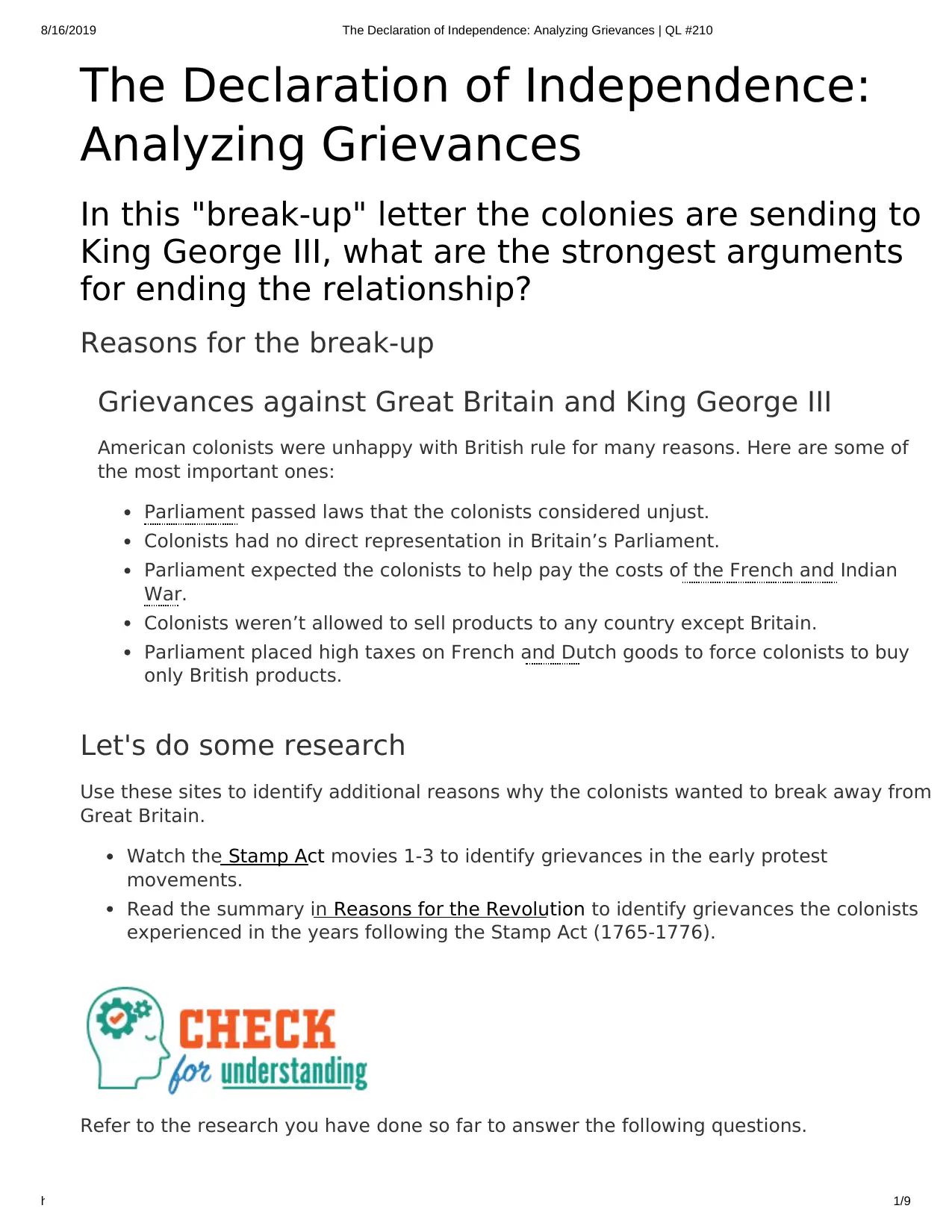
8/16/2019 The Declaration of Independence: Analyzing Grievances | QL #210
https://www.curriculumpathways.com/portal/Launch?id=210 1/9
The Declaration of Independence:
Analyzing Grievances
In this "break-up" letter the colonies are sending to
King George III, what are the strongest arguments
for ending the relationship?
Reasons for the break-up
Grievances against Great Britain and King George III
American colonists were unhappy with British rule for many reasons. Here are some of
the most important ones:
Parliament passed laws that the colonists considered unjust.
Colonists had no direct representation in Britain’s Parliament.
Parliament expected the colonists to help pay the costs of the French and Indian
War.
Colonists weren’t allowed to sell products to any country except Britain.
Parliament placed high taxes on French and Dutch goods to force colonists to buy
only British products.
Let's do some research
Use these sites to identify additional reasons why the colonists wanted to break away from
Great Britain.
Watch the Stamp Act movies 1-3 to identify grievances in the early protest
movements.
Read the summary in Reasons for the Revolution to identify grievances the colonists
experienced in the years following the Stamp Act (1765-1776).
Refer to the research you have done so far to answer the following questions.
https://www.curriculumpathways.com/portal/Launch?id=210 1/9
The Declaration of Independence:
Analyzing Grievances
In this "break-up" letter the colonies are sending to
King George III, what are the strongest arguments
for ending the relationship?
Reasons for the break-up
Grievances against Great Britain and King George III
American colonists were unhappy with British rule for many reasons. Here are some of
the most important ones:
Parliament passed laws that the colonists considered unjust.
Colonists had no direct representation in Britain’s Parliament.
Parliament expected the colonists to help pay the costs of the French and Indian
War.
Colonists weren’t allowed to sell products to any country except Britain.
Parliament placed high taxes on French and Dutch goods to force colonists to buy
only British products.
Let's do some research
Use these sites to identify additional reasons why the colonists wanted to break away from
Great Britain.
Watch the Stamp Act movies 1-3 to identify grievances in the early protest
movements.
Read the summary in Reasons for the Revolution to identify grievances the colonists
experienced in the years following the Stamp Act (1765-1776).
Refer to the research you have done so far to answer the following questions.
Paraphrase This Document
Need a fresh take? Get an instant paraphrase of this document with our AI Paraphraser
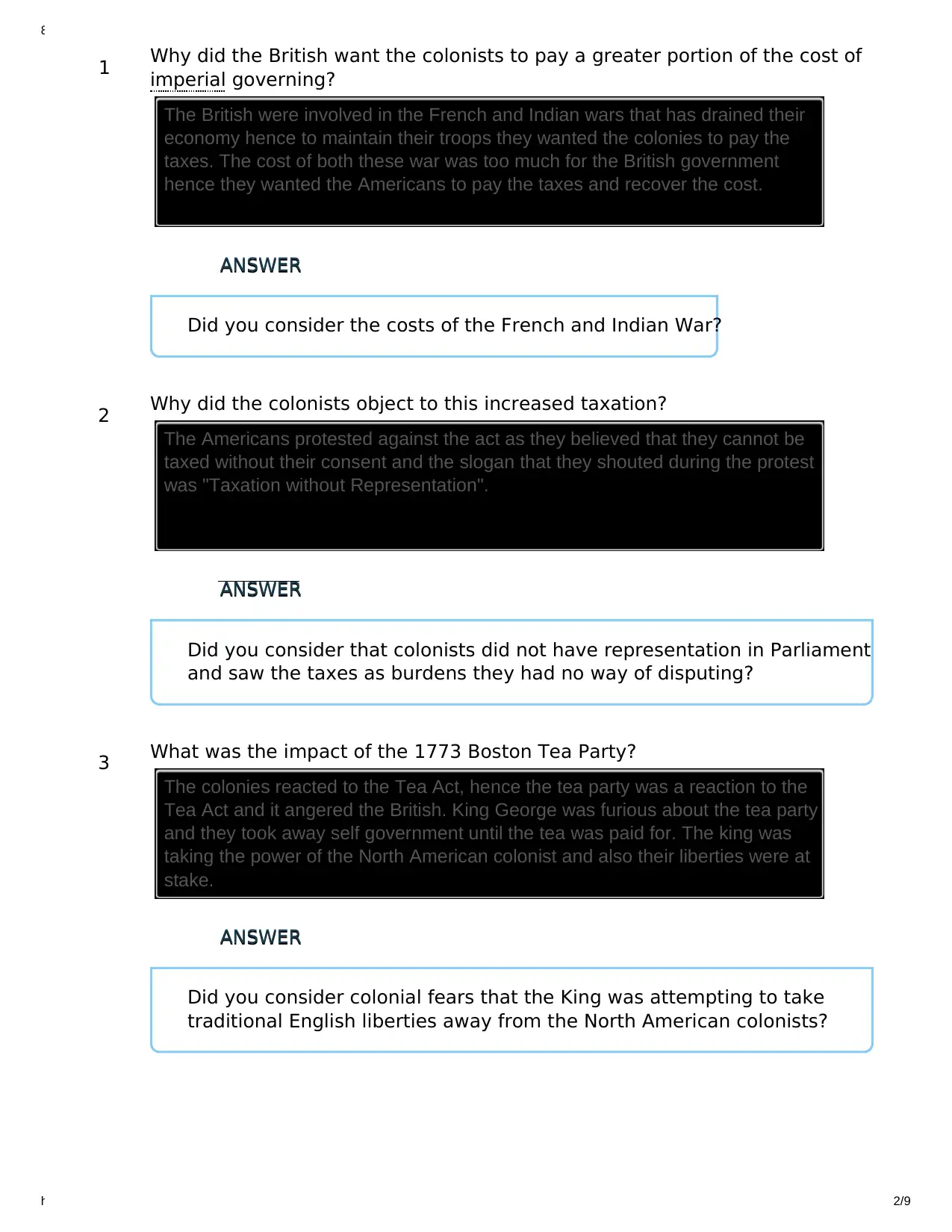
8/16/2019 The Declaration of Independence: Analyzing Grievances | QL #210
https://www.curriculumpathways.com/portal/Launch?id=210 2/9
1 Why did the British want the colonists to pay a greater portion of the cost of
imperial governing?
The British were involved in the French and Indian wars that has drained their
economy hence to maintain their troops they wanted the colonies to pay the
taxes. The cost of both these war was too much for the British government
hence they wanted the Americans to pay the taxes and recover the cost.
Did you consider the costs of the French and Indian War?
ANSWERANSWER
2 Why did the colonists object to this increased taxation?
The Americans protested against the act as they believed that they cannot be
taxed without their consent and the slogan that they shouted during the protest
was "Taxation without Representation".
Did you consider that colonists did not have representation in Parliament
and saw the taxes as burdens they had no way of disputing?
ANSWERANSWER
3 What was the impact of the 1773 Boston Tea Party?
The colonies reacted to the Tea Act, hence the tea party was a reaction to the
Tea Act and it angered the British. King George was furious about the tea party
and they took away self government until the tea was paid for. The king was
taking the power of the North American colonist and also their liberties were at
stake.
Did you consider colonial fears that the King was attempting to take
traditional English liberties away from the North American colonists?
ANSWERANSWER
https://www.curriculumpathways.com/portal/Launch?id=210 2/9
1 Why did the British want the colonists to pay a greater portion of the cost of
imperial governing?
The British were involved in the French and Indian wars that has drained their
economy hence to maintain their troops they wanted the colonies to pay the
taxes. The cost of both these war was too much for the British government
hence they wanted the Americans to pay the taxes and recover the cost.
Did you consider the costs of the French and Indian War?
ANSWERANSWER
2 Why did the colonists object to this increased taxation?
The Americans protested against the act as they believed that they cannot be
taxed without their consent and the slogan that they shouted during the protest
was "Taxation without Representation".
Did you consider that colonists did not have representation in Parliament
and saw the taxes as burdens they had no way of disputing?
ANSWERANSWER
3 What was the impact of the 1773 Boston Tea Party?
The colonies reacted to the Tea Act, hence the tea party was a reaction to the
Tea Act and it angered the British. King George was furious about the tea party
and they took away self government until the tea was paid for. The king was
taking the power of the North American colonist and also their liberties were at
stake.
Did you consider colonial fears that the King was attempting to take
traditional English liberties away from the North American colonists?
ANSWERANSWER
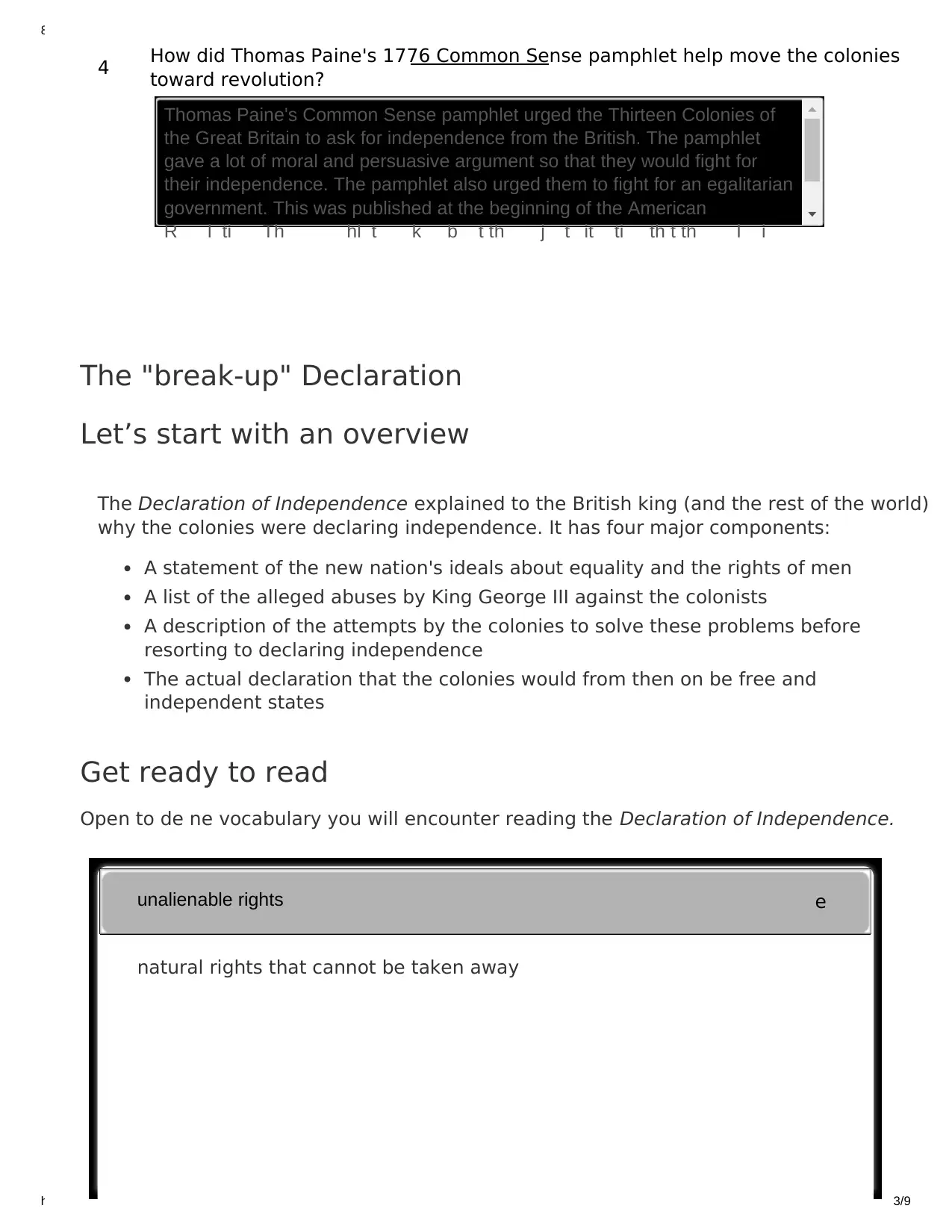
8/16/2019 The Declaration of Independence: Analyzing Grievances | QL #210
https://www.curriculumpathways.com/portal/Launch?id=210 3/9
The "break-up" Declaration
4 How did Thomas Paine's 1776 Common Sense pamphlet help move the colonies
toward revolution?
Thomas Paine's Common Sense pamphlet urged the Thirteen Colonies of
the Great Britain to ask for independence from the British. The pamphlet
gave a lot of moral and persuasive argument so that they would fight for
their independence. The pamphlet also urged them to fight for an egalitarian
government. This was published at the beginning of the American
R l ti Th hl t k b t th j t it ti th t th l i
Let’s start with an overview
The Declaration of Independence explained to the British king (and the rest of the world)
why the colonies were declaring independence. It has four major components:
A statement of the new nation's ideals about equality and the rights of men
A list of the alleged abuses by King George III against the colonists
A description of the attempts by the colonies to solve these problems before
resorting to declaring independence
The actual declaration that the colonies would from then on be free and
independent states
Get ready to read
Open to de ne vocabulary you will encounter reading the Declaration of Independence.
eunalienable rights
natural rights that cannot be taken away
https://www.curriculumpathways.com/portal/Launch?id=210 3/9
The "break-up" Declaration
4 How did Thomas Paine's 1776 Common Sense pamphlet help move the colonies
toward revolution?
Thomas Paine's Common Sense pamphlet urged the Thirteen Colonies of
the Great Britain to ask for independence from the British. The pamphlet
gave a lot of moral and persuasive argument so that they would fight for
their independence. The pamphlet also urged them to fight for an egalitarian
government. This was published at the beginning of the American
R l ti Th hl t k b t th j t it ti th t th l i
Let’s start with an overview
The Declaration of Independence explained to the British king (and the rest of the world)
why the colonies were declaring independence. It has four major components:
A statement of the new nation's ideals about equality and the rights of men
A list of the alleged abuses by King George III against the colonists
A description of the attempts by the colonies to solve these problems before
resorting to declaring independence
The actual declaration that the colonies would from then on be free and
independent states
Get ready to read
Open to de ne vocabulary you will encounter reading the Declaration of Independence.
eunalienable rights
natural rights that cannot be taken away
⊘ This is a preview!⊘
Do you want full access?
Subscribe today to unlock all pages.

Trusted by 1+ million students worldwide
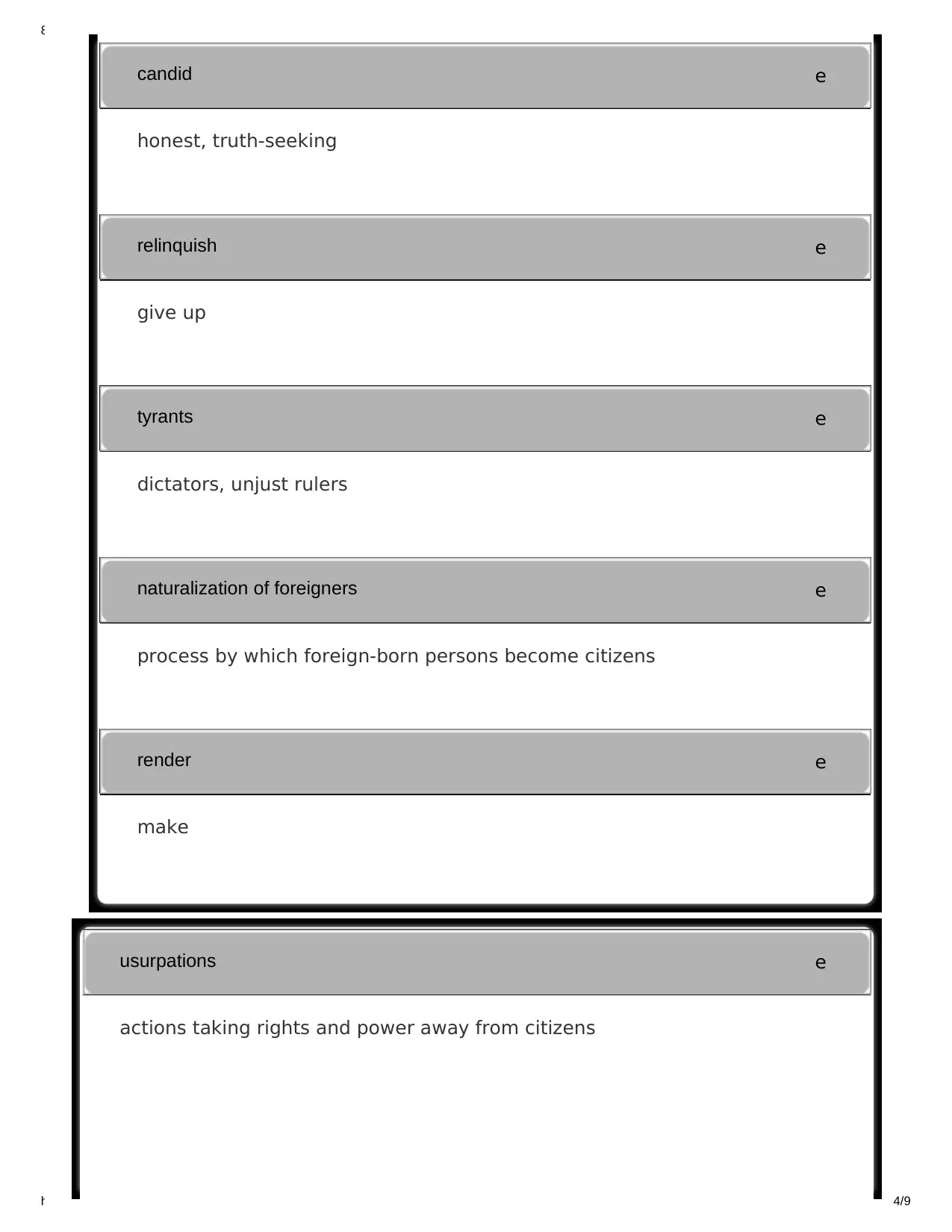
8/16/2019 The Declaration of Independence: Analyzing Grievances | QL #210
https://www.curriculumpathways.com/portal/Launch?id=210 4/9
ecandid
honest, truth-seeking
erelinquish
give up
etyrants
dictators, unjust rulers
enaturalization of foreigners
process by which foreign-born persons become citizens
erender
make
eusurpations
actions taking rights and power away from citizens
https://www.curriculumpathways.com/portal/Launch?id=210 4/9
ecandid
honest, truth-seeking
erelinquish
give up
etyrants
dictators, unjust rulers
enaturalization of foreigners
process by which foreign-born persons become citizens
erender
make
eusurpations
actions taking rights and power away from citizens
Paraphrase This Document
Need a fresh take? Get an instant paraphrase of this document with our AI Paraphraser
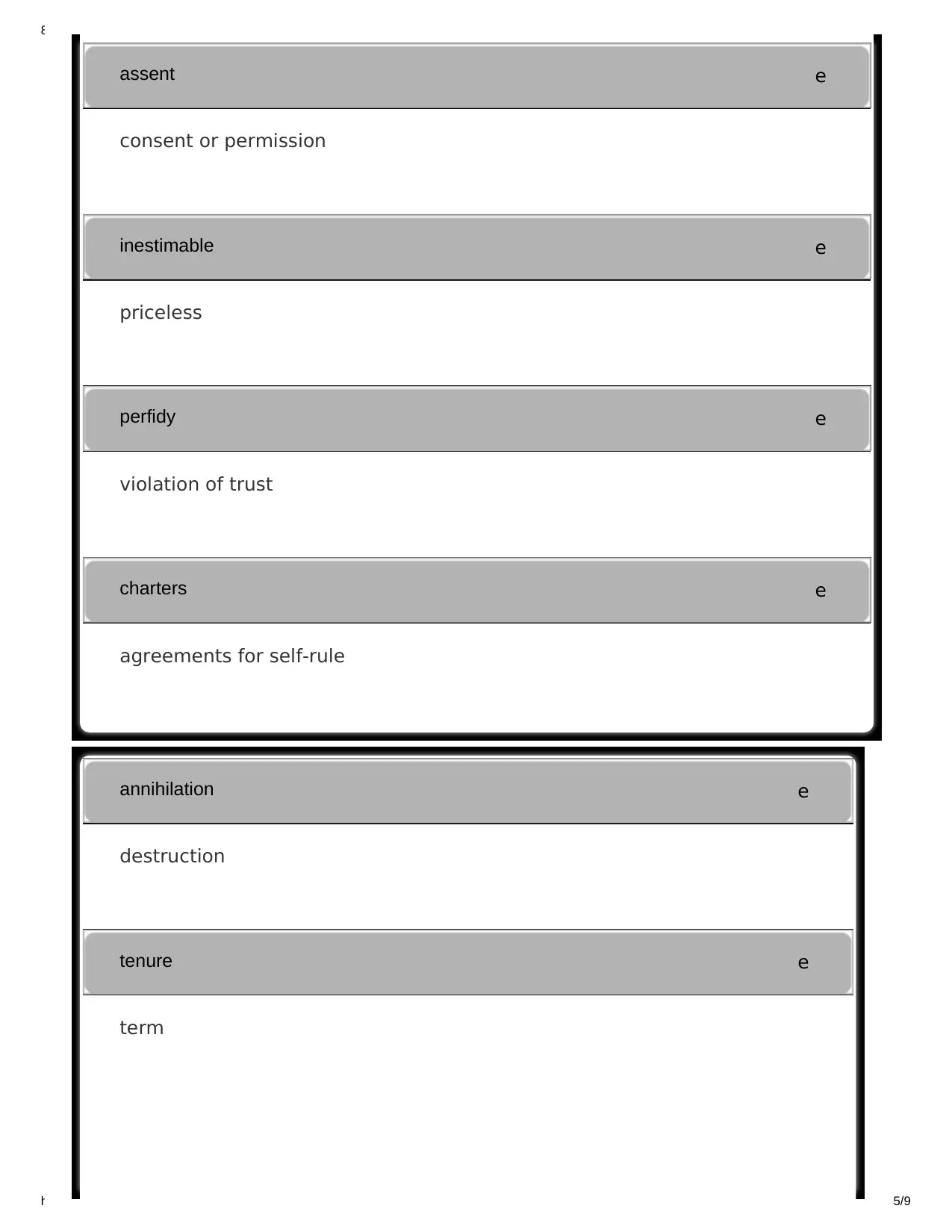
8/16/2019 The Declaration of Independence: Analyzing Grievances | QL #210
https://www.curriculumpathways.com/portal/Launch?id=210 5/9
eassent
consent or permission
einestimable
priceless
eperfidy
violation of trust
echarters
agreements for self-rule
eannihilation
destruction
etenure
term
https://www.curriculumpathways.com/portal/Launch?id=210 5/9
eassent
consent or permission
einestimable
priceless
eperfidy
violation of trust
echarters
agreements for self-rule
eannihilation
destruction
etenure
term
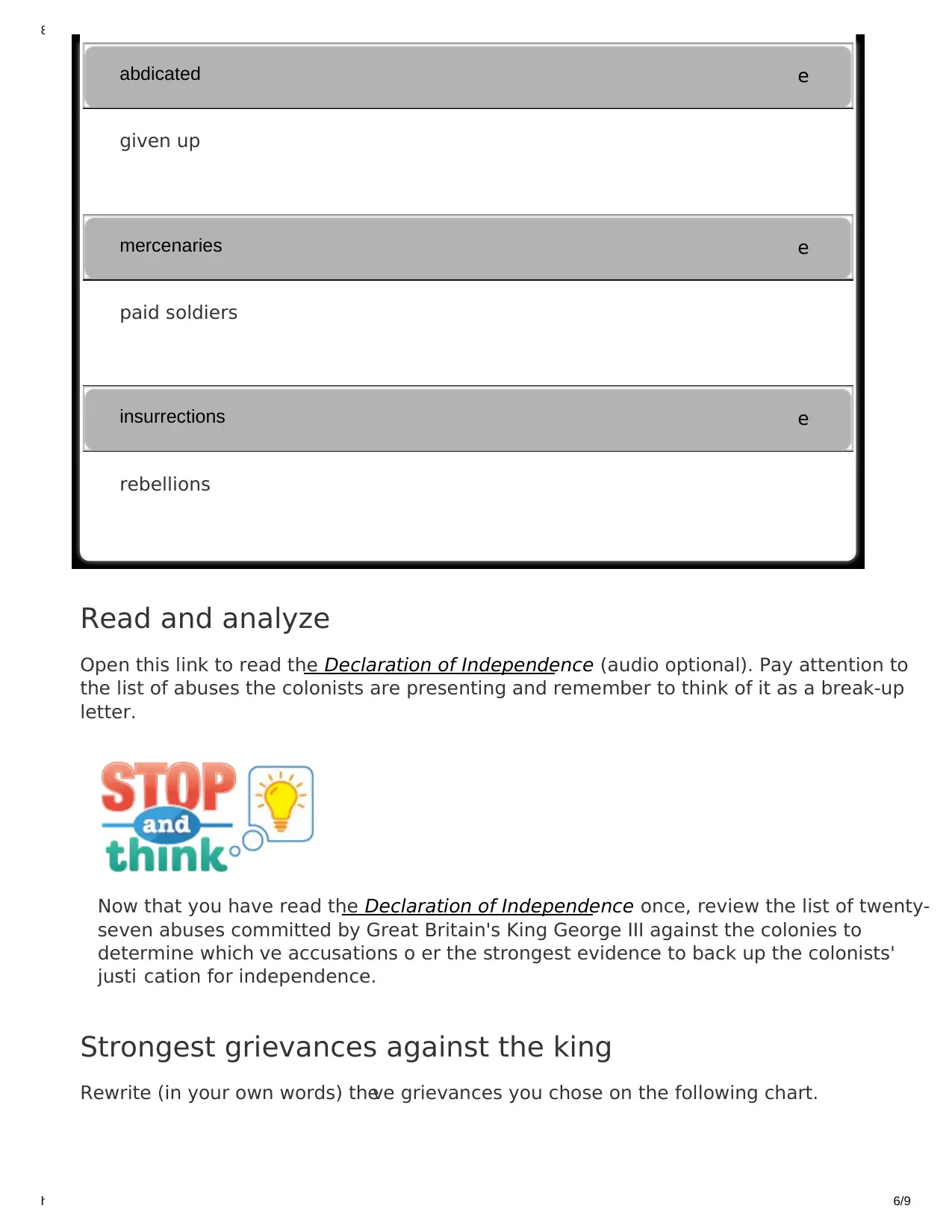
8/16/2019 The Declaration of Independence: Analyzing Grievances | QL #210
https://www.curriculumpathways.com/portal/Launch?id=210 6/9
eabdicated
given up
emercenaries
paid soldiers
einsurrections
rebellions
Read and analyze
Open this link to read the Declaration of Independence (audio optional). Pay attention to
the list of abuses the colonists are presenting and remember to think of it as a break-up
letter.
Now that you have read the Declaration of Independence once, review the list of twenty-
seven abuses committed by Great Britain's King George III against the colonies to
determine which ve accusations o er the strongest evidence to back up the colonists'
justi cation for independence.
Strongest grievances against the king
Rewrite (in your own words) theve grievances you chose on the following chart.
https://www.curriculumpathways.com/portal/Launch?id=210 6/9
eabdicated
given up
emercenaries
paid soldiers
einsurrections
rebellions
Read and analyze
Open this link to read the Declaration of Independence (audio optional). Pay attention to
the list of abuses the colonists are presenting and remember to think of it as a break-up
letter.
Now that you have read the Declaration of Independence once, review the list of twenty-
seven abuses committed by Great Britain's King George III against the colonies to
determine which ve accusations o er the strongest evidence to back up the colonists'
justi cation for independence.
Strongest grievances against the king
Rewrite (in your own words) theve grievances you chose on the following chart.
⊘ This is a preview!⊘
Do you want full access?
Subscribe today to unlock all pages.

Trusted by 1+ million students worldwide
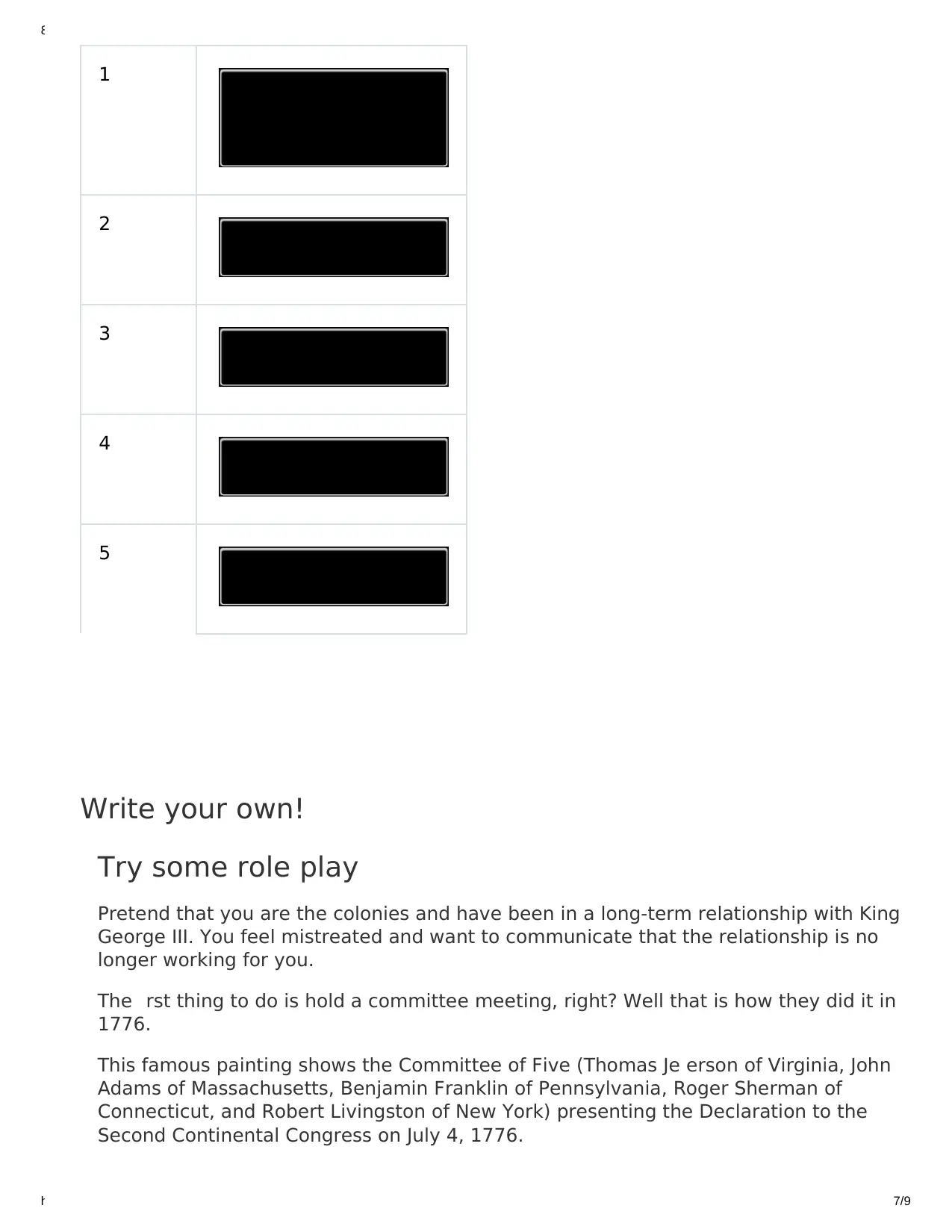
8/16/2019 The Declaration of Independence: Analyzing Grievances | QL #210
https://www.curriculumpathways.com/portal/Launch?id=210 7/9
Write your own!
1
2
3
4
5
Try some role play
Pretend that you are the colonies and have been in a long-term relationship with King
George III. You feel mistreated and want to communicate that the relationship is no
longer working for you.
The rst thing to do is hold a committee meeting, right? Well that is how they did it in
1776.
This famous painting shows the Committee of Five (Thomas Je erson of Virginia, John
Adams of Massachusetts, Benjamin Franklin of Pennsylvania, Roger Sherman of
Connecticut, and Robert Livingston of New York) presenting the Declaration to the
Second Continental Congress on July 4, 1776.
https://www.curriculumpathways.com/portal/Launch?id=210 7/9
Write your own!
1
2
3
4
5
Try some role play
Pretend that you are the colonies and have been in a long-term relationship with King
George III. You feel mistreated and want to communicate that the relationship is no
longer working for you.
The rst thing to do is hold a committee meeting, right? Well that is how they did it in
1776.
This famous painting shows the Committee of Five (Thomas Je erson of Virginia, John
Adams of Massachusetts, Benjamin Franklin of Pennsylvania, Roger Sherman of
Connecticut, and Robert Livingston of New York) presenting the Declaration to the
Second Continental Congress on July 4, 1776.
Paraphrase This Document
Need a fresh take? Get an instant paraphrase of this document with our AI Paraphraser
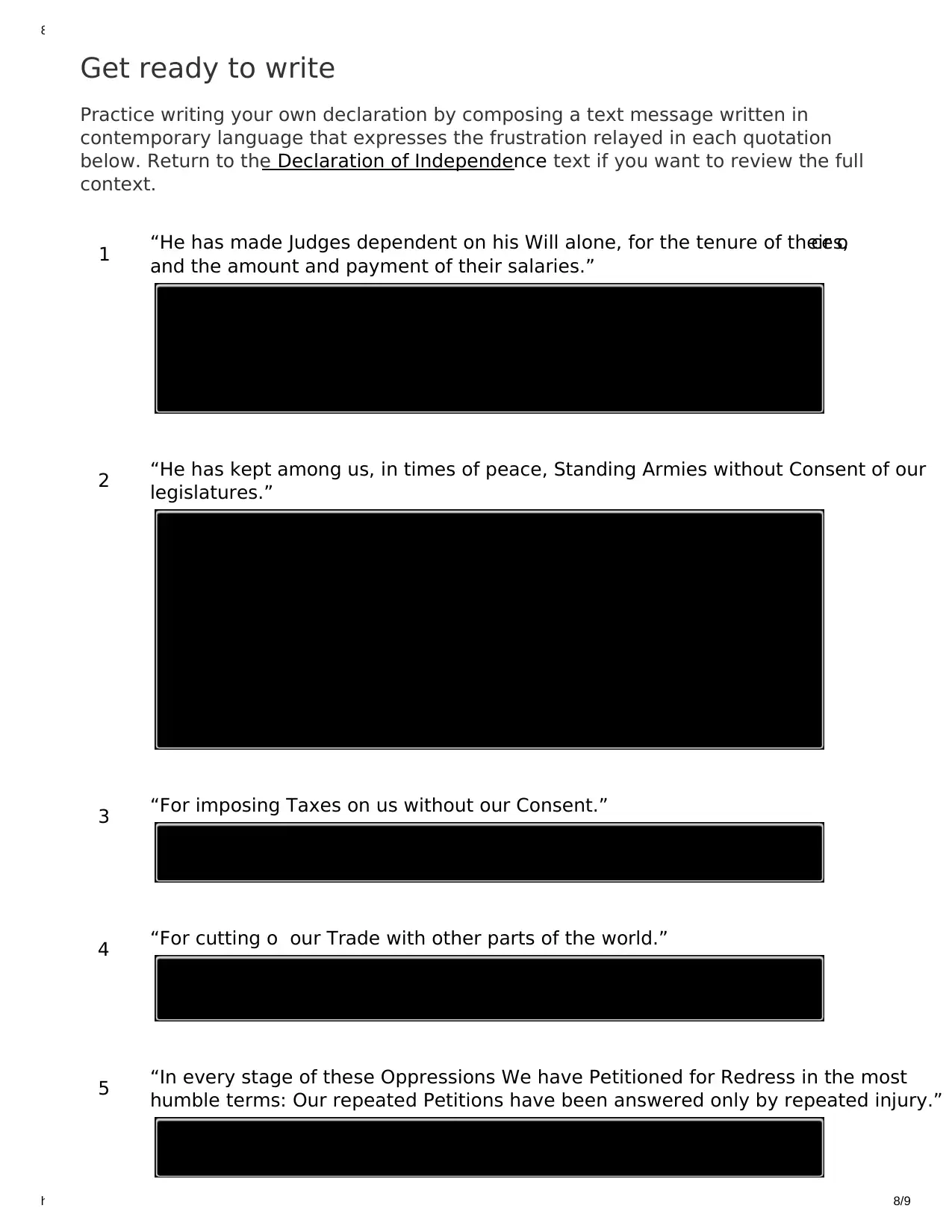
8/16/2019 The Declaration of Independence: Analyzing Grievances | QL #210
https://www.curriculumpathways.com/portal/Launch?id=210 8/9
Get ready to write
Practice writing your own declaration by composing a text message written in
contemporary language that expresses the frustration relayed in each quotation
below. Return to the Declaration of Independence text if you want to review the full
context.
1 “He has made Judges dependent on his Will alone, for the tenure of their oces,
and the amount and payment of their salaries.”
2 “He has kept among us, in times of peace, Standing Armies without Consent of our
legislatures.”
3 “For imposing Taxes on us without our Consent.”
4 “For cutting o our Trade with other parts of the world.”
5 “In every stage of these Oppressions We have Petitioned for Redress in the most
humble terms: Our repeated Petitions have been answered only by repeated injury.”
https://www.curriculumpathways.com/portal/Launch?id=210 8/9
Get ready to write
Practice writing your own declaration by composing a text message written in
contemporary language that expresses the frustration relayed in each quotation
below. Return to the Declaration of Independence text if you want to review the full
context.
1 “He has made Judges dependent on his Will alone, for the tenure of their oces,
and the amount and payment of their salaries.”
2 “He has kept among us, in times of peace, Standing Armies without Consent of our
legislatures.”
3 “For imposing Taxes on us without our Consent.”
4 “For cutting o our Trade with other parts of the world.”
5 “In every stage of these Oppressions We have Petitioned for Redress in the most
humble terms: Our repeated Petitions have been answered only by repeated injury.”

8/16/2019 The Declaration of Independence: Analyzing Grievances | QL #210
https://www.curriculumpathways.com/portal/Launch?id=210 9/9
Remember when you write your own
Be sure to also include the actions you (the colonies) have taken to improve the
situation.
Provide evidence that you have tried to make this relationship work, but George is being
impossible. Put some feeling in it!
In a series of text messages (or a more formal letter, if you prefer), complain about George
III’s behavior and give specic examples of his most outrageous o enses (the ones you
outlined in the chart you completed).
For some additional examples, take a look at these:
The Most Famous Break-Up Letter of All Time
Break Up Letter Directions
https://www.curriculumpathways.com/portal/Launch?id=210 9/9
Remember when you write your own
Be sure to also include the actions you (the colonies) have taken to improve the
situation.
Provide evidence that you have tried to make this relationship work, but George is being
impossible. Put some feeling in it!
In a series of text messages (or a more formal letter, if you prefer), complain about George
III’s behavior and give specic examples of his most outrageous o enses (the ones you
outlined in the chart you completed).
For some additional examples, take a look at these:
The Most Famous Break-Up Letter of All Time
Break Up Letter Directions
⊘ This is a preview!⊘
Do you want full access?
Subscribe today to unlock all pages.

Trusted by 1+ million students worldwide
1 out of 9
Related Documents
Your All-in-One AI-Powered Toolkit for Academic Success.
+13062052269
info@desklib.com
Available 24*7 on WhatsApp / Email
![[object Object]](/_next/static/media/star-bottom.7253800d.svg)
Unlock your academic potential
Copyright © 2020–2026 A2Z Services. All Rights Reserved. Developed and managed by ZUCOL.





